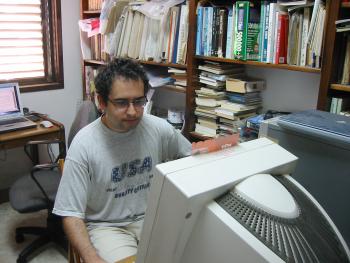01-April-2010: Freecell Solver Enterprises™, Inc., on behalf of the
Freecell Solver™ development
team, is glad to announce the upcoming availability of Freecell Solver™
Enterprise Edition. In its Enterprise Edition, Freecell Solver™ will be
enhanced to solve generalised Freecell, in which there can be an arbitrary
number of card ranks. Since generalised Freecell is NP-complete. This will
allow us to use Freecell Solver™'s ingenious, cutting-edge algorithms to
solve the previously hard, provably NP-Complete problems of
the
Travelling Salesman problem,
Subset sum,
Sudoku and
Enterprise
content management.
Since we expect some of our customers to wish to solve NP-complete problems
with data sets of an order larger than the standard computer word (32-bit or
64-bit), we are going to start using
the "GNU MP Bignum Library" (GMP). As our
CTO, Ron Johnson, says By making use of Freecell Solver™ Enterprise
Edition's sophisticated algorithms, we expect a cluster of 2,000 32-way
high-performance supercomputers to solve a 17,179,869,184 (2 to the power of 34)
problem, a short time before the heat death of the universe.
That's not the only change expected in Freecell Solver™ Enterprise Edition.
Until now Freecell Solver™ was written in ANSI C and was dependent only on
the standard C library. To make it more enterprise ready, we decided to convert
to such enterprise-ready languages as C++ and Java, and to utilise such
enterprise-ready
Cross-Platform
Abstraction Libraries such as Boost, Qt, glib, Apache's Portable
Runtime (APR), or ACE. Our CTO continues: Phil Greenspun
said
that “Any sufficiently complicated C or Fortran program contains an ad hoc,
informally-specified, bug-ridden, slow implementation of half of
Common Lisp.”. Well, now Freecell Solver™ will contain an
ad hoc, informally-specified, bug-ridden and slow, but
enterprise ready, implementation of half of Common Lisp. This
is really very exciting.
We don't know yet which of these libraries
we are going to use, but we are likely to use more than one based on the
enterprise-readiness of their individual components.
Naturally, as the company behind Freecell Solver™ Enterprise Edition,
Freecell Solver Enterprises™ does not expect to keep Freecell Solver™'s
original
permissive
licence, the MIT/X11
License, because code which is licensed under it is easy to abuse,
misuse, and generally use. Instead, the core Freecell Solver™ Enterprise
Edition functionality would be available under the
Affero
General Public License (AGPL) version 3, while making some extended
functionality available only under own own custom, proprietary licence -
exclusively for paying customers. We are really excited about this change
which will
allow use to protect our
intellectual
property from people and enterprises who will abuse, misuse or
generally just use it.
Here is what others say about that:
-
Don Knuth: Freecell Solver™ Enterprise Edition really
excites me. I didn't think I'll see the day to see an Enterprise-ready
NP-complete solver, but Freecell Solver™ EE made it happen. I can't
wait to play with it.
-
Larry Wall: Freecell Solver™ Enterprise Edition is the
epitome of Laziness and Hubris, but unfortunately requires a lot of
Patience.
-
Bill and Ted: Enterprise Content Management! Yeah!!! Star
Trek is Excellent, bro. Excellent!!! So where's Captain Kirk?
-
Shlomi Fish (the original creator of Freecell Solver):
Eh, what the hell?
As you can see, everybody are united in their opinion that Freecell Solver™
Enterprise Edition is the best thing since Enterprise bread came sliced
by and for enterprises.
One can download the Freecell Solver™ Enterprise Edition
version 1.0.0 source tarball, and after resolving all the
essential
dependencies and building it (as documented in the INSTALL file),
type ./fc-solve --help-enterprise to get help for the enterprise
features.
